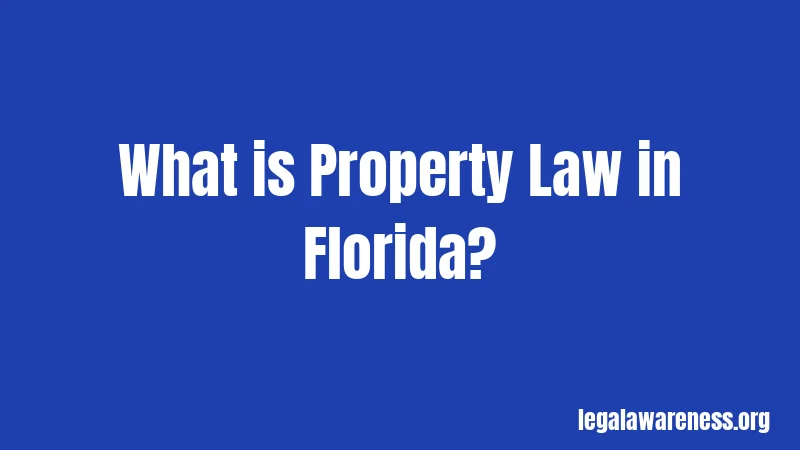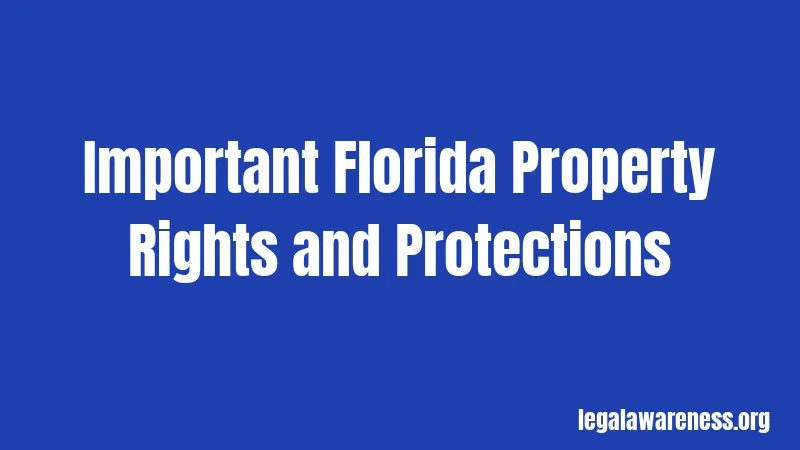Florida Property Laws in 2026: Your Complete Homeowner’s Guide
Most people don’t realize how specific Florida’s property laws actually are. Seriously. Whether you own a home here, rent one, or are thinking about buying, these rules affect you. The good news? They’re not as complicated as they sound. We’re going to break down exactly what you need to know.
Florida has some unique property laws compared to other states. The state protects homeowners, sets rules for renters, and has specific guidelines about what you can and can’t do with your land. Some of these rules might surprise you. Let’s start with the basics.
What is Property Law in Florida?

Florida property law covers everything related to land and buildings. Think of it like a rulebook for homeownership. It tells you what rights you have as an owner. It also explains what responsibilities you have.
Property law includes things like how to buy a house, what happens if someone gets hurt on your property, and how property taxes work. It covers disputes between neighbors too. These rules protect both property owners and people who visit properties.
Basic Florida Property Laws
Homestead Exemption and Protection
Here’s something cool: Florida has what’s called a homestead exemption. This is basically protection for your primary home. Sound complicated? It’s actually pretty straightforward.
If you own a home in Florida and it’s your main residence, you can apply for homestead protection. This exemption reduces your property taxes. You get a significant reduction on the assessed value of your home. Most homeowners can save hundreds of dollars per year.
But wait, there’s more to know. Homestead protection also shields your primary home from certain creditors. So if you have debt, creditors can’t force you to sell your homestead to pay what you owe. Not all debts qualify, though. Some obligations, like mortgages and property taxes, can still result in foreclosure.
Property Ownership Rights and Boundaries
You might think you own everything under your land too. Actually, Florida law is more complex. You own the land surface where your house sits. You also have rights to reasonable use of the airspace above your property.
But here’s where it gets interesting: you don’t own everything below ground. The state controls mineral rights and water rights differently. If someone owns the mineral rights to your property, they can extract minerals. You have limited control over that.
Boundaries matter a lot in Florida. You need to know exactly where your property ends and your neighbor’s begins. Unclear boundaries cause tons of disputes. That’s why you should get a professional survey done before buying property.
Property Taxes in Florida
Wondering what you’ll pay in property taxes? Florida’s system is pretty fair compared to other states. The state has no income tax, which means it relies on property taxes for revenue.
Your property tax assessment depends on the home’s market value. The county appraiser determines this value each year. You can challenge the assessment if you think it’s too high. Most counties have a formal process for this.
Tax rates vary by county in Florida. Some areas have higher rates than others. When you buy property, ask about the specific tax rate for that county. It should be clearly listed in your purchase documents.
Important Florida Property Rights and Protections

The Castle Doctrine and Self-Defense
Florida actually has something called the Castle Doctrine. You’ve probably heard of it. This law says you have no duty to retreat in your own home. If someone breaks in, you can defend yourself using necessary force.
This law only applies to your own home or vehicle. It doesn’t apply to other places. You can’t just defend yourself with any force you want either. The force has to be reasonable given the threat.
The Castle Doctrine protects you legally if someone gets hurt during a break-in. You won’t face criminal charges or civil lawsuits. But remember, you have to reasonably believe someone is trying to harm you or commit a felony.
Property Maintenance and Code Compliance
Your property has to meet certain standards in Florida. Local governments set code requirements. These cover things like the condition of your house, your yard, and outdoor structures.
If your property violates local codes, the city or county can force you to fix it. You might get fined if you don’t comply. Serious violations can result in heavy penalties. Honestly, this is the part most people miss until the city sends them a notice.
Different cities have different rules. Some are strict about yard maintenance. Others focus on building safety. Check with your local government about specific requirements for your area.
Tenant Rights and Rental Properties
If you own rental property in Florida, you need to follow landlord laws. Tenants have specific rights under Florida law. As a landlord, you have responsibilities too.
You can’t just evict someone whenever you want. There are legal processes you must follow. You need valid reasons to evict. Those reasons include non-payment of rent or breaking the lease terms.
Landlords must keep rental properties in habitable condition. You need functioning plumbing, electrical systems, and heating. The roof can’t leak. The structure has to be safe. These aren’t optional. Tenants can break their lease if you don’t maintain the property properly.
Specific Situations and Special Rules
Condominiums and Homeowners Associations
Florida condos operate under special rules. When you buy a condo, you’re buying more than just your unit. You’re also buying into the association.
Homeowners associations (HOAs) have rules for the community. They can enforce restrictions on your property. You have to follow HOA rules if you choose to live there. Sometimes these rules feel strict, but the HOA has legal authority to enforce them.
The state has laws protecting condo owners from unfair practices though. HOAs must disclose financial information. They need to hold meetings. They can’t make sudden rule changes without notice. You have some protections as a member.
Florida’s Adverse Possession Law
Here’s an interesting one. Someone could potentially claim your land if they use it for long enough without permission. This is called adverse possession. Not sure what counts as a violation? Let me break it down.
For adverse possession to work in Florida, someone must use your property openly and continuously. They need to do this without your permission. The use has to continue for seven years (or ten years in some cases). After that time, they can claim ownership.
This isn’t something that happens by accident. The person must clearly be using your land. A neighbor parking on your property occasionally doesn’t qualify. But someone building structures on your land and maintaining them for years might.
The best way to prevent adverse possession? Post no trespassing signs. Use your property regularly. Block access if possible. Tell anyone using it that they don’t have permission.
Florida’s Flood and Hurricane Laws
Florida’s weather creates unique property challenges. Flood is a huge issue in this state. The state has specific laws about flooding and flood insurance.
If your property is in a flood zone, you must carry flood insurance if you have a mortgage. Your lender will require it. Regular homeowners insurance doesn’t cover flood damage. This requirement protects both you and the lender.
Florida also has hurricane-related laws. Insurance companies have rules about what they’ll cover. Wind damage is typically covered. But the state carefully regulates what insurers can deny. Property owners in hurricane zones pay higher insurance premiums. That’s just the reality in Florida.
Easements and Right of Way
An easement gives someone else the right to use part of your property. Power companies often have easements. So do water districts. These easements allow them to access their equipment or infrastructure on your land.
You still own the property even with an easement. But you can’t block access. You can’t build permanent structures over the easement area. The person with easement rights can enter when needed for maintenance.
Easements can be a surprise when buying property. Always check the title report. It will list any easements. Knowing about them before buying helps you make informed decisions.
Penalties and What Happens When You Break the Rules

Criminal Penalties for Property Crimes
Breaking Florida property laws can result in serious consequences. The penalties depend on what you did and how serious it is.
Trespassing is a crime in Florida. First offense trespassing is a second-degree misdemeanor. You could face up to 60 days in jail. Fines can reach $500. If you trespass again, the penalties increase.
Burglary is much more serious. Breaking into someone’s home or building is a felony. You could face years in prison. Sentences vary based on whether weapons were involved and whether anyone was inside. Burglary convictions carry serious prison time.
Property damage through vandalism is also punishable. Vandalizing someone’s property can cost you. You’d face charges and have to pay restitution. That means paying for the damage you caused.
Civil Penalties and Fines
Beyond criminal charges, you could face civil penalties. These are money damages. Property violations can result in fines. Code enforcement can fine you for not maintaining your property properly.
HOA violations might result in fines. The association can fine you for breaking community rules. They can also place a lien on your property if you don’t pay. A lien means they have a legal claim against your home.
Property boundary disputes can result in lawsuits. If you harm your neighbor’s property, they can sue you. You might have to pay for repairs and pain and suffering. Legal fees add up fast too.
Foreclosure and Property Loss
Failure to pay property taxes can result in foreclosure. The county can take your home if you fall far enough behind. You get notices, but if you don’t catch up, the county sells your property.
Mortgage lenders can foreclose if you don’t make payments. This is the most common way people lose properties. The lender can take back the house and sell it. You lose your equity and damage your credit.
HOA liens for unpaid fines can also lead to foreclosure. If your HOA places a lien and you don’t pay, they can foreclose on your home. This is less common but absolutely possible.
Special Circumstances and Exceptions
Primary Residence vs. Investment Property
Florida treats primary residences differently from investment properties. Your main home gets homestead protection. Investment properties don’t get this same protection.
Investment property owners can’t claim homestead exemption. They pay higher property taxes. They also have more restrictions on what they can do. But they can deduct mortgage interest and property taxes on their taxes.
If you own rental property, you have landlord responsibilities. You must maintain it. You must follow eviction laws. You must keep adequate insurance. Investment property laws are stricter than primary residence laws.
Divorce and Property Division
Divorce affects property rights in Florida. The state is an equitable distribution state, not community property. That means property gets divided fairly, not necessarily 50/50.
Your primary homestead is treated specially in divorce. The homestead typically can’t be sold without both spouses’ approval. This protects family housing. It ensures the surviving spouse and minor children have a home.
If you’re going through divorce, property becomes a serious issue. Get professional legal advice. A lawyer can help protect your interests. Property divisions happen during the divorce process, not after.
Native American and Government Property
Some properties in Florida are held in trust by the government for Native American tribes. These properties have unique status. The state has limited authority over them. Tribal law applies instead.
Federal and state government properties also have special rules. You generally can’t sue the government over property disputes. Special processes exist for these claims. Government immunity is a real thing in property law.
Public lands and parks have restrictions. You can use them, but you can’t develop them. Trespassing on government property carries the same penalties as trespassing on private land.
How to Protect Your Property Rights
Get a Professional Survey
Before buying property, get a survey done. A professional surveyor marks exactly where your property boundaries are. This costs money upfront but saves huge amounts later.
Surveys show easements and other encumbrances. They reveal boundary disputes. They confirm the property size. This information is critical before you buy. Don’t skip this step.
Maintain Proper Insurance
You need homeowners insurance in Florida. Mortgage lenders require it. It covers your home and personal property. It also covers liability if someone gets hurt on your property.
Flood insurance is often separate. If you’re in a flood zone, get it. Wind insurance might be separate too. Check your policy. Make sure you have adequate coverage for all risks.
File Important Documents
Keep your deed in a safe place. File it with the county. The deed proves you own the property. Don’t lose it or hide it somewhere you can’t find it.
Maintain clear title records. Update documents when something changes. If you add someone’s name to the deed, file new documents. Keeping records clean prevents disputes.
Know Your Boundaries and Rights
Talk to your neighbors about boundaries. Mark disputed areas. Take photos. Document what’s happening. If there’s a dispute, you’ll have evidence.
Read your HOA documents if you live in an association. Know the rules. Understand the restrictions. Attend meetings. Stay informed about community issues.
Respond to Legal Notices Immediately
If you get a code violation notice, respond. Don’t ignore it. Code enforcement can fine you and place liens. Responding shows you’re taking it seriously.
If you get an eviction notice as a tenant, get a lawyer. If you’re being sued over property, respond to legal documents. Missing deadlines can result in automatic losses.
Frequently Asked Questions
Can someone build on my property if they ask permission? Permission changes everything. If you give written permission, they can build. Without permission, they’re trespassing. Always put permission in writing. Verbal permission creates confusion later.
What happens if my neighbor’s fence is on my property? You can require them to move it. You can also sue for damages. Start by talking to the neighbor. If talking doesn’t work, hire a surveyor. Use the survey to show they’re trespassing. Then send a legal notice.
Do I need to pay property taxes on inherited property? Yes. Inherited property is still property. You have to pay taxes on it. You might qualify for homestead exemption if it becomes your primary residence. The taxes don’t disappear just because you inherited the property.
Can an HOA sell my home for unpaid fines? Yes, but it takes time and legal process. The HOA places a lien first. If you don’t pay, they can foreclose. The process can take years. Pay HOA fines when they’re assessed to avoid this outcome.
What’s the difference between owning and renting? Owners have responsibilities but rights. They can modify the property (within code). Renters have fewer responsibilities. Landlords maintain the property. Renters can’t make permanent changes. Renting is temporary. Ownership is permanent.
Final Thoughts
Florida property laws protect everyone. They protect owners, renters, neighbors, and visitors. They’re not meant to be complicated. They’re meant to keep things fair.
The biggest takeaway? Know the basics. Get a survey before buying. Maintain your property. Respect your neighbors. Follow HOA rules if you live in an association. Keep your insurance current.
Property disputes happen. When they do, seek professional help. Talk to a real estate lawyer. They know Florida law inside and out. They can protect your interests.
Stay informed about changes to Florida law. Property laws update sometimes. What was true last year might change this year. Keep checking for updates. Talk to professionals when you’re unsure.
Now you know the basics about Florida property law. You understand homestead protection. You know about boundaries and easements. You understand the penalties for violations. You’re ready to make informed decisions about property in Florida.
References
- Florida Statutes Chapter 195 (Homestead Property Tax Exemption)
- Florida Statutes Chapter 83 (Residential Tenancies)
- Florida Department of Revenue Property Tax Information
- Florida Statutes 776 (Use of Force in Self-Defense)
- Florida Bar – Find a Real Estate Attorney
- Condominium and Homeowners Association Laws (Chapter 718-719)
- Florida Adverse Possession Law (Florida Statutes 95.18)
